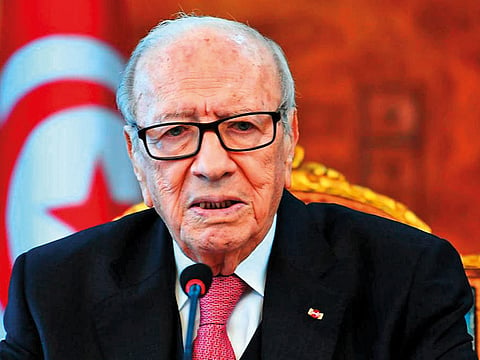Tunisia president: Alliance with Islamists over
Announcement likely to stir fresh strains in coalition

Tunis - Efforts to rescue Tunisia’s ailing economy face the prospect of fresh turmoil after the president declared his alliance with moderate Islamists at an end, deepening divisions in a fragile coalition managing the country’s transition from autocracy.
Political analysts say Monday evening’s announcement by President Beji Qaid Al Sebsi could make it difficult for the government to enact tough economic reforms sought by international lenders.
“There will be no real risk of toppling the government in parliament, but the problem is that division will deepen, social tension will rise and reforms are threatened under a fragile government coalition,” Nizar Makni, a journalist and analyst said.
“Reforms need broad consensus and the lack of compromise may lead to mass protests in the streets, especially that powerful unions rejected all proposed reforms”, he added.
Although struggling with high unemployment and inflation, the coalition of moderate Islamists and secular forces has been running what has been hailed as the Arab Spring’s only democratic success, avoiding the upheaval seen in Egypt, Libya or Syria.
The Al Nahda Islamist party and secular Nidaa Tounes agreed in 2014 on a constitution granting far-reaching political rights, limiting the role of religion and holding free elections.
But Tunisia fell into a political crisis again this year after Al Sebsi’s son, who is the leader of Nidaa Tounes, called for the dismissal of prime minister Yousuf Chahed because of his government’s failure to revive the economy.
His demand was supported by the powerful UGTT union, which rejected economic reforms proposed by Chahed.
But Al Nahda came to Chahed’s defence, saying the departure of the prime minister would hit stability at a time when the country needed economic reforms.
In his more than two years in office, Chahed has pushed through austerity measures and structural reforms, such as cutting fuel subsidies that have helped to underpin a $2.8 billion loan from the International Monetary Fund (IMF) and other financial support.
The president raised the stakes on Monday evening.
“The consensus and relationship between me and Al Nahda has ended, after they chose to form another relationship with Yousuf Chahed,” Al Sebsi, the founder of Nidaa Tounes, said in a televised interview.
Analysts said the president’s announcement would probably not lead to the overthrow of the government, which still has the support of at least 110 of a total 217 lawmakers in parliament.
But Chahed could find it difficult to enact tough reforms in the face of a strong opposition front including the unions, the president and Nidaa Tounes party.



